-
LETTER TO THE EDITOR
Adherence to COVID-19 vaccination during the pandemic and fake news: Correspondence
Revista Brasileira de Enfermagem. 2024;77:e202477Suppl101c
01-10-2024
Abstract
LETTER TO THE EDITORAdherence to COVID-19 vaccination during the pandemic and fake news: Correspondence
Revista Brasileira de Enfermagem. 2024;77:e202477Suppl101c
01-10-2024DOI 10.1590/0034-7167.202477Suppl101c
Views0Dear Dr Dulce Aparecida BarbosaEditor in Chief of the Revista Brasileira de Enfermagem[…]See more -
REVIEW
Nurses’ practical contributions to improving healthy and sustainable public spaces: an integrative review
Revista Brasileira de Enfermagem. 2024;77:e20240023
01-10-2024
Abstract
REVIEWNurses’ practical contributions to improving healthy and sustainable public spaces: an integrative review
Revista Brasileira de Enfermagem. 2024;77:e20240023
01-10-2024DOI 10.1590/0034-7167-2024-0023
Views0ABSTRACT
Objective:
to identify knowledge production about nurses’ contributions to improving healthy and sustainable public spaces.
Methods:
an integrative review carried out in February 2023 in electronic databases. Studies that answered the research question and that were available in full, in Portuguese, English and Spanish, were included.
Results:
a total of five articles were selected. The findings highlighted the importance of educational projects in the training of local managers and community autonomy; citizen participation and health promotion as ways to implement Sustainable Development Goal 11; nurses as facilitators of collective care; new health practices and modes of producing subjectivity; and use of public transportation, bicycles and/or walking in these spaces.
Final considerations:
there is a clear need for greater incentives from local governments to develop effective sustainability strategies that are led by nurses and the community.
Keywords:AttitudesCommunity HealthHealth KnowledgeHealthy Lifestyle, NursesNursesPracticeSustainable DevelopmentSee more
-
ORIGINAL ARTICLE
Analysis of the convergence of the Safety Attitudes Questionnaire and the Hospital Survey on Patient Safety Culture
Revista Brasileira de Enfermagem. 2023;76(1):e20210379
12-16-2023
Abstract
ORIGINAL ARTICLEAnalysis of the convergence of the Safety Attitudes Questionnaire and the Hospital Survey on Patient Safety Culture
Revista Brasileira de Enfermagem. 2023;76(1):e20210379
12-16-2023DOI 10.1590/0034-7167-2021-0379
Views0See moreABSTRACT
Objectives:
to analyze patient safety culture from nursing professionals’ perception at a university hospital, by assessing the convergence between the Safety Attitudes Questionnaire and the Hospital Survey on Patient Safety Culture.
Methods:
a cross-sectional study, with 434 nursing professionals. Data collection took place through the application of both instruments. Descriptive and inferential statistics were used.
Results:
in the Hospital Survey on Patient Safety Culture, the “teamwork within the units” dimension was considered a strong area of patient safety. In the Safety Attitudes Questionnaire, the “job satisfaction” and “perception of stress” domains reached the score for a good safety culture. Patient safety culture perception is correlated, in both instruments, with high magnitude.
Conclusions:
the two instruments converge towards a similar assessment of patient safety culture.
-
ORIGINAL ARTICLE
Tangency and multiple factors of violence against lecturer: nuances of the experience in pedagogical practices in health education
Revista Brasileira de Enfermagem. 2023;76(1):e20210865
12-16-2023
Abstract
ORIGINAL ARTICLETangency and multiple factors of violence against lecturer: nuances of the experience in pedagogical practices in health education
Revista Brasileira de Enfermagem. 2023;76(1):e20210865
12-16-2023DOI 10.1590/0034-7167-2021-0865
Views0See moreABSTRACT
Objective:
to identify factors that lead the teacher to experience violence in their pedagogical practice in health education.
Method:
research with a qualitative approach, based on the Grounded Theory, conducted with 11 professors of the nursing course of a public university in the central region of Brazil in 2020 and 2021. Online semi-structured interviews were analyzed partially in the light of the Constructivist Grounded Theory.
Results:
factors that lead lecturer to experience violence are characterized by institutional culture, gender, professor’s perception of violence, and the triggers that drive students to commit violence. Social status and inequalities lead to positions of domination and, consequently, create a fertile ground for violence.
Final Considerations:
analyzing violence under Bourdieu’s theory, it is clear that student violence towards lecturer and the reports contained in this study deserve pedagogical reflection. However, it is necessary to include these discussions as a background in teaching environments.
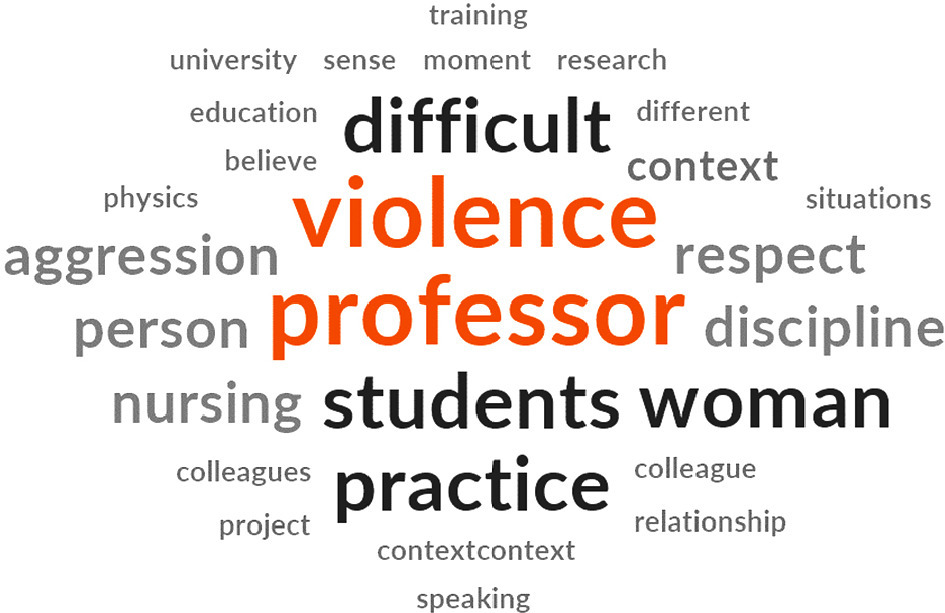
-
REVIEW
Multilevel model in the identification of behavioral and structural risk factors for HIV: integrative review
Revista Brasileira de Enfermagem. 2023;76(1):e20210853
12-16-2023
Abstract
REVIEWMultilevel model in the identification of behavioral and structural risk factors for HIV: integrative review
Revista Brasileira de Enfermagem. 2023;76(1):e20210853
12-16-2023DOI 10.1590/0034-7167-2021-0853
Views0See moreABSTRACT
Objectives:
to investigate studies that adopted the multilevel analysis model to identify behavioral and structural risk factors associated with HIV infection.
Methods:
an integrative review of the literature with studies available in full, obtained from EMBASE, CINAHL, Pubmed, and Scopus, whose selected descriptors were the indexed terms: “HIV”, “multilevel analysis” and “behavior”.
Results:
the search resulted in 236 studies. Out of these, ten studies comprised the sample. Economic disadvantage, neighborhood characteristics, housing instability, incarceration, transactional sex, multiple partners, substance abuse, and age at first intercourse were classified as structural and behavioral risk factors for HIV. Reduced socioeconomic disadvantage, provision of housing stability, and condom use were associated with protective factors for HIV exposure.
Conclusions:
by applying the multilevel model in risk factor research studies, it was possible to identify the structural and behavioral elements of HIV risk.
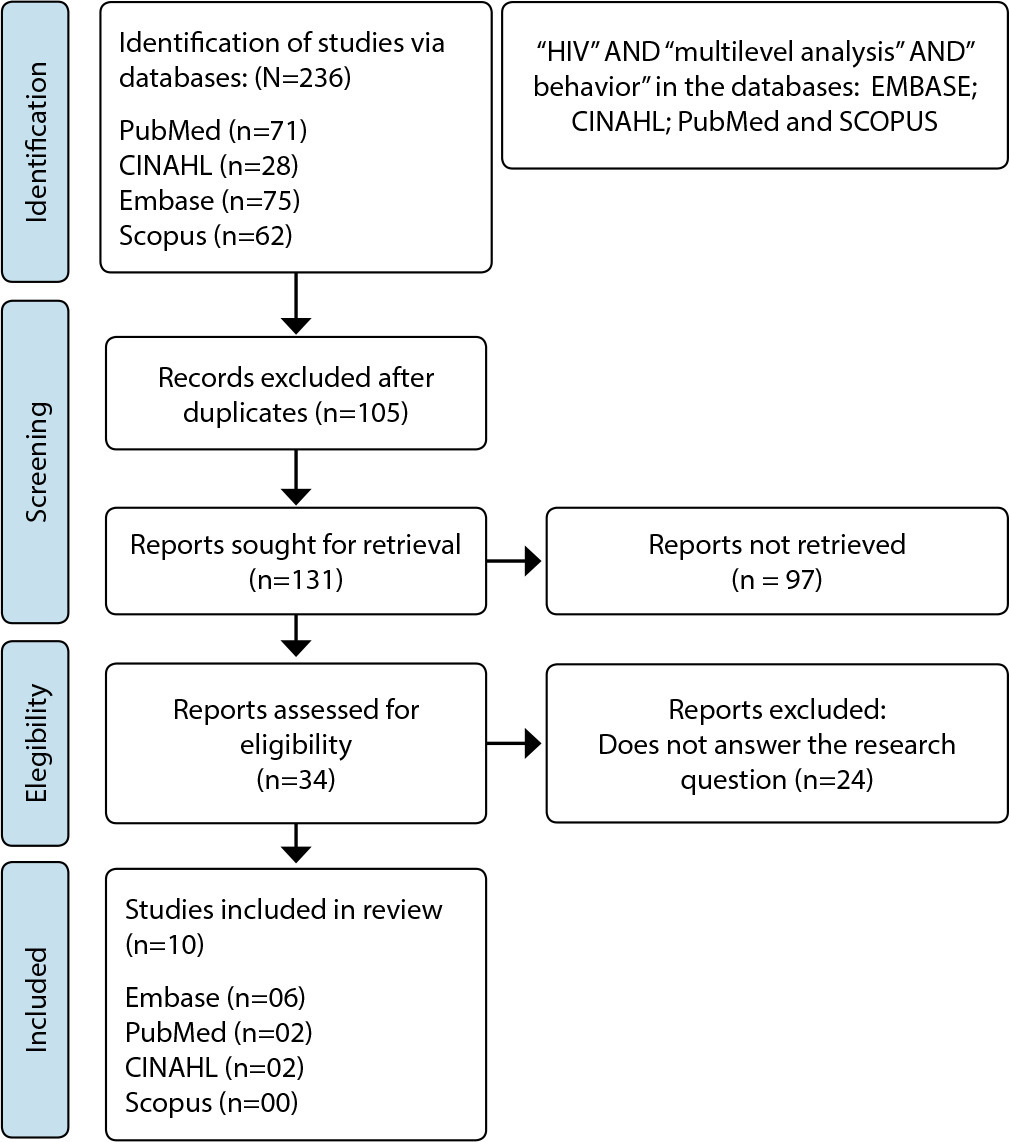
-
ORIGINAL ARTICLE
Fatores psicossociais correlacionados com a intenção comportamental das pessoas com diabetes mellitus tipo 2 (DM2) para uso de insulina
Revista Brasileira de Enfermagem. 2023;76(1):e20210617
12-16-2023
Abstract
ORIGINAL ARTICLEFatores psicossociais correlacionados com a intenção comportamental das pessoas com diabetes mellitus tipo 2 (DM2) para uso de insulina
Revista Brasileira de Enfermagem. 2023;76(1):e20210617
12-16-2023DOI 10.1590/0034-7167-2021-0617
Views0See moreRESUMEN
Objetivos:
analizar los factores psicosociales correlacionados con la intención conductal de personas con diabetes mellitus tipo 2 (DM2) para uso de insulina.
Métodos:
estudio transversal. Instrumento validado basado en la Teoría de Conducta Planeada fue utilizada para identificar las medidas directas (actitud, norma subjetiva y control percibido), medidas indirectas (creencias conductuales, normativas y de control) e intención conductal para uso de insulina. Análisis descriptivo y correlación de Spearman fueron realizados para el análisis de datos.
Resultados:
un total de 211 individuos participaron del estudio, con una mediana positiva de intención conductal. Actitud, creencias normativas y conductuales fueron los predictores que presentaron una correlación significante (r=0,16, r=-0,15 y r=0,25, respectivamente; p<0,05) con la intención.
Conclusiones:
hay una intención conductal positiva en el uso de insulina por personas con DM2. Actitud, creencias Normativas y creencias conductuales tienen una correlación de baja magnitud con la intención de personas con DM2 de usar insulina.
-
ORIGINAL ARTICLE
Psychosocial factors related to the behavioral intention of people with type 2 diabetes using insulin
Revista Brasileira de Enfermagem. 2023;76(1):e20210617
12-16-2023
Abstract
ORIGINAL ARTICLEPsychosocial factors related to the behavioral intention of people with type 2 diabetes using insulin
Revista Brasileira de Enfermagem. 2023;76(1):e20210617
12-16-2023DOI 10.1590/0034-7167-2021-0617
Views0See moreABSTRACT
Objectives:
to analyze the psychosocial factors correlated with the behavioral intention of people with Type 2 Diabetes Mellitus (T2DM) towards insulin use.
Methods:
a cross-sectional study; a validated instrument based on the Theory of Planned Behavior was used to identify the direct measures (attitude, subjective norm and perceived control), indirect measures (behavioral, normative and control beliefs) and behavioral intention for the use of insulin. Descriptive analysis and Spearman’s correlation were performed for data analysis.
Results:
a total of 211 individuals participated in the study, with a positive median of behavioral intention. Attitude, normative and behavioral beliefs were the psychosocial factors that presented a significant correlation (r=0.16, r=-0,15 and r=0.25, respectively; p<0.05) with the intention.
Conclusions:
there is a positive behavioral intention in the use of insulin by people with T2DM. Attitude, normative beliefs and behavioral beliefs have a low magnitude correlation with the intention of people with T2DM to use insulin.
-
ORIGINAL ARTICLE
Changes implemented in the work environment of nurses in the COVID-19 pandemic
Revista Brasileira de Enfermagem. 2022;75:e20201381
11-29-2022
Abstract
ORIGINAL ARTICLEChanges implemented in the work environment of nurses in the COVID-19 pandemic
Revista Brasileira de Enfermagem. 2022;75:e20201381
11-29-2022DOI 10.1590/0034-7167-2020-1381
Views0See moreABSTRACT
Objective:
to describe the changes implemented in the work environment of nurses in university hospitals considering the COVID-19 pandemic.
Methods:
this qualitative and descriptive research was developed from an online survey with 75 nurses from three Brazilian university hospitals. Data processing occurred through textual analysis with the aid of software IRAMUTEQ.
Results:
five semantic classes were obtained: Organization of units for exclusive care of patients with COVID-19; Adaptations in the use of personal protective equipment; Physical structure adaptation; Care flow institution; Increased number of beds and training courses. Final considerations: the results show the effort of healthcare and nursing professionals/managers in the development of structural adaptations and reorganizations of care processes, in the hospital context, to respond with quality and efficiency to the demands arising from the COVID-19 pandemic.
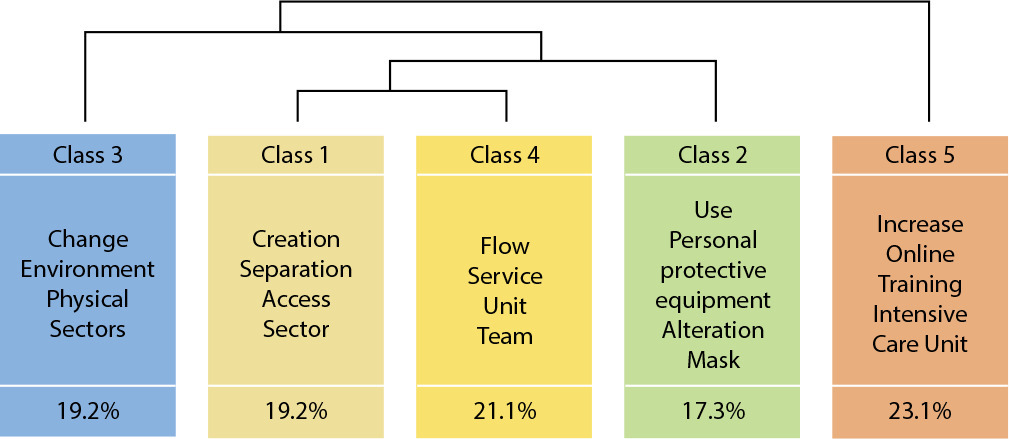
-
ORIGINAL ARTICLE
Permanent education for good practices in the prevention of pressure injury: almost-experiment
Revista Brasileira de Enfermagem. 2019;72(6):1646-1652
10-21-2019
Abstract
ORIGINAL ARTICLEPermanent education for good practices in the prevention of pressure injury: almost-experiment
Revista Brasileira de Enfermagem. 2019;72(6):1646-1652
10-21-2019DOI 10.1590/0034-7167-2018-0778
Views0See moreABSTRACT
Objective:
To verify the effectiveness of the educational intervention through the evaluation of nurses’ knowledge about prevention of pressure injury.
Method:
A quasi-experimental study with a single group, carried out with 95 nurses from a teaching hospital in the interior of Minas Gerais, in August and September 2017. As a teaching strategy, the active methodology and hybrid teaching were used, based on the reference of the Method of the Arch of Charles Maguerez. Data were collected from a validated instrument, called the Pieper Knowledge Test, and analyzed by descriptive statistics and Student’s t-test with significance level of p <0.001.
Results:
The mean number of correct answers obtained by the nurses was 78.8% in the pre-test and 88.8% in the post-test, and the difference was statistically significant (p <0.001).
Conclusion:
The educational intervention developed was effective, since it contributed to the improvement of nurses’ knowledge.

-
ORIGINAL ARTICLE
Nurse care for the hospitalized elderly’s spiritual dimension
Revista Brasileira de Enfermagem. 2019;72:236-242
12-05-2019
Abstract
ORIGINAL ARTICLENurse care for the hospitalized elderly’s spiritual dimension
Revista Brasileira de Enfermagem. 2019;72:236-242
12-05-2019DOI 10.1590/0034-7167-2018-0685
Views0See moreABSTRACT
Objective:
to analyze the nurse care for the spiritual hospitalized elderly’s dimension.
Method:
a qualitative study, based on Jean Watson’s Theory of Human Caring. The study included 17 nurses working in a geriatric center in Salvador City, Bahia State, Brazil. The collection of testimonies occurred between January and April of 2018, through an interview.
Results:
spiritual care were dialogue, encouragement and respect for religious activities, embracement, empathy. One of the obstacles to providing this care was the lack of preparation in accessing the elderly’s spiritual dimension.
Final considerations:
spirituality is a dimension of human and holistic nursing care. Caring for the spirit contributes to foster transpersonal care. The difficulty may be in the lack of nurses’ preparation. It is necessary that they cultivate and live their own spirituality, transmitting the understanding in each care relationship.
-
EXPERIENCE REPORT
Use of webQDA software on qualitative nursing research: an experience report
Revista Brasileira de Enfermagem. 2020;73(3):e20180411
04-03-2020
Abstract
EXPERIENCE REPORTUse of webQDA software on qualitative nursing research: an experience report
Revista Brasileira de Enfermagem. 2020;73(3):e20180411
04-03-2020DOI 10.1590/0034-7167-2018-0411
Views0See moreABSTRACT
Objectives:
to report the user experience of the webQDA software in the support of qualitative data analysis about health literacy of older adults.
Methods:
quasi-experimental research developed from January 2014 to January 2015, with 118 older adults, all of whom were interviewed to assess the level of health literacy. Interviews were carried out before and after four educational interventions, according to Freire’s method named Culture Circle. The interviews were transcribed and entered in the software, which highlighted the analytical categories.
Results:
the systems of sources, interpretative encoding and questioning of the data available in the software allowed the construction of three categories for the literacy levels and four categories for their dimensions.
Final considerations:
We concluded that the webQDA software enables the structured encoding of qualitative materials, ensuring faster and effective management of data with systematization and analytical transparency.

-
Concept analysis of Perioperative Thirst for the development of a new nursing diagnosis
Revista Brasileira de Enfermagem. 2021;74(1):e20200065
03-03-2021
Abstract
Concept analysis of Perioperative Thirst for the development of a new nursing diagnosis
Revista Brasileira de Enfermagem. 2021;74(1):e20200065
03-03-2021DOI 10.1590/0034-7167-2020-0065
Views0See moreABSTRACT
Objectives:
to analyze the perioperative thirst concept for the development of a new diagnostic structure according to NANDA International.
Methods:
a concept analysis study based on the framework proposed by Walker and Avant, instrumentalized through an integrative literature review based on SCOPUS, CINAHL, PUBMED, LILACS, and WOS. The elaboration of the diagnostic structure followed NANDA International guidelines.
Results:
41 studies were analyzed revealing that perioperative thirst is prevalent and intense, having visceral and behavioral attributes as the core of the concept. Antecedents indicate that surgical patients are vulnerable to thirst; and consequents 16 signs and symptoms were organized and model cases were developed. A diagnostic structure has been developed for perioperative thirst.
Final Considerations:
concept analysis allowed language standardization that describes thirsty patients, helping the identification, planning of actions and communication of perioperative nursing care.
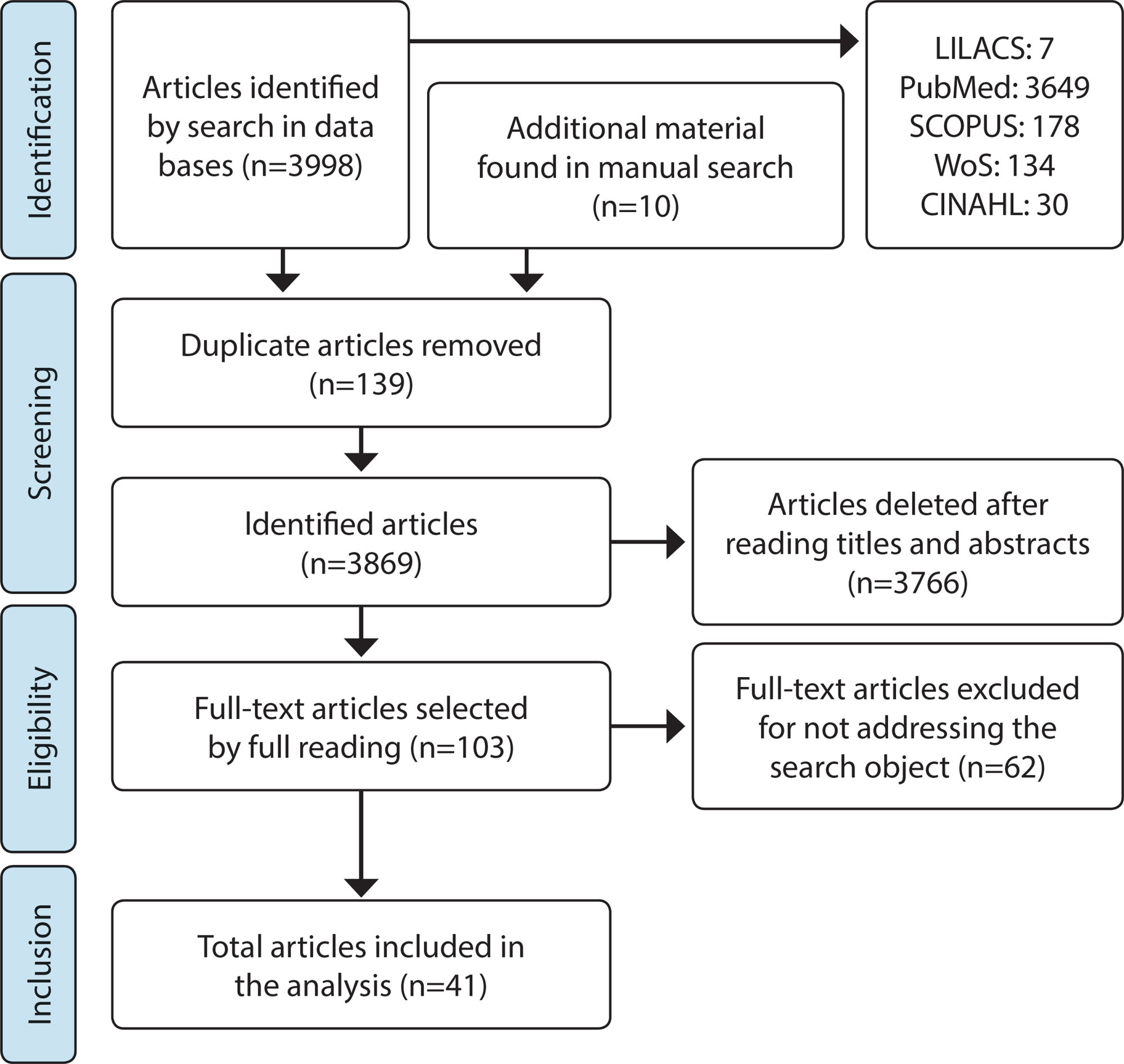
-
REFLECTION
Nursing Process in the Brazilian context: reflection on its concept and legislation
Revista Brasileira de Enfermagem. 2022;75(6):e20210898
05-11-2022
Abstract
REFLECTIONNursing Process in the Brazilian context: reflection on its concept and legislation
Revista Brasileira de Enfermagem. 2022;75(6):e20210898
05-11-2022DOI 10.1590/0034-7167-2021-0898
Views0ABSTRACT
Objectives:
to reflect on the global understanding of the Nursing Process concept, with emphasis on the Brazilian context.
Methods:
a reflection article, aligned with the vision and expertise of researchers who are members of the Nursing Process Research Network.
Results:
the reflection is presented in two main topics: The evolution of Systematization of Nursing Care X Nursing Process concepts and its consonance with national and international practices, and Brazilian legislation; The Nursing Process concept realignment in Brazilian legislation in line with current care, teaching and research practices. Final Considerations: the reflections were oriented to the Nursing Process’ conceptual, normative and legal issues, including elements of its historical evolution, and, with that, pointed to the need to modify the Brazilian regulation on the Nursing Process.
Keywords:Education, NursingLegislationNursingNursing CareNursing ProcessStandardized Nursing TerminologySee more -
ORIGINAL ARTICLE
Creation and validation of a visual educational technology content for lactation physiology learning
Revista Brasileira de Enfermagem. 2020;73(6):e20190564
09-07-2020
Abstract
ORIGINAL ARTICLECreation and validation of a visual educational technology content for lactation physiology learning
Revista Brasileira de Enfermagem. 2020;73(6):e20190564
09-07-2020DOI 10.1590/0034-7167-2019-0564
Views0ABSTRACT
Objective:
to create and validate a visual educational technology content for lactation physiology learning.
Method:
a methodological study that contemplated the stages of content creation and validation guided by the conceptual model of Knowledge Translation into action. The creation took place in partnership with the educational technology center of the project’s home institution. The validation was attended by 27 judges with experience in the obstetric, neonatal, pediatric or maternal and child areas and in the theme of breastfeeding.
Results:
an educational technology covered animation and video techniques to locate, respectively, elements of lactation physiology and the population involved. An Overall Content Validity Index of 0.84 was obtained.
Conclusion:
the visual educational technology for lactation physiology learning has been validated in content as a tool to introduce the theme and mediate health education actions that can have a positive impact on breastfeeding.
Keywords:Audiovisual ResourcesEducational TechnologyHealth EducationLactationTranslational Medical ResearchSee more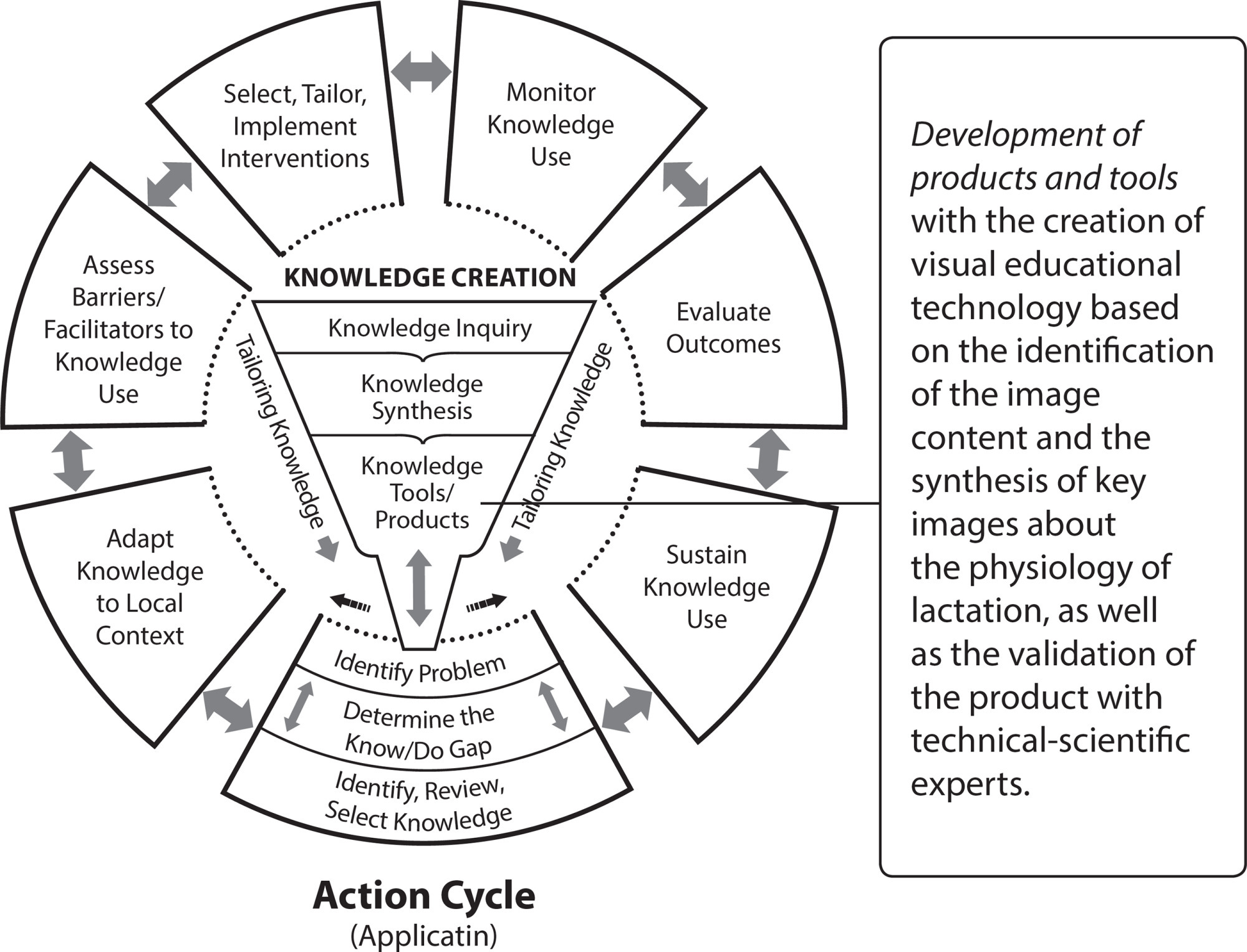
-
ORIGINAL ARTICLE
Risk of suicide among nursing students
Revista Brasileira de Enfermagem. 2021;74(6):e20200867
08-20-2021
Abstract
ORIGINAL ARTICLERisk of suicide among nursing students
Revista Brasileira de Enfermagem. 2021;74(6):e20200867
08-20-2021DOI 10.1590/0034-7167-2020-0867
Views0See moreABSTRACT
Objectives:
to identify the risk and degree of risk of suicide in nursing students of a public institution in the countryside of Pernambuco, Brazil.
Methods:
this was a cross-sectional, quantitative research conducted with 150 students. For data collection, a sociodemographic questionnaire and the instrument, M.I.N.I. – Brazilian version 5.0.0 – Module C – Risk of suicide were used. Statistical analyses were performed with IBM(® )SPSS(®), version 23.
Results:
53.3% of nursing students had a risk of suicide, of which 20.7% had a high risk. Moreover, 22.67% reported previous suicide attempt. It is noteworthy that students without a partner have a higher risk of suicide (56.8%) than those with a partner (29.4%).
Conclusions:
it is perceived the need to develop programs that identify students at risk of suicide in higher education institutions, in order to raise awareness of the problem and implement policies to promote mental health in the academia.
Search
Search in:
Nuvem de Tags
Aged (144) Atenção Primária à Saúde (239) COVID-19 (104) Cuidados de Enfermagem (269) Educação em Enfermagem (151) Educação em Saúde (139) Enfermagem (930) Estudos de Validação (131) Health Education (144) Idoso (208) Mental Health (149) Nursing (987) Nursing Care (306) Patient Safety (151) Primary Health Care (284) Qualidade de Vida (104) Quality of Life (106) Saúde Mental (145) Segurança do Paciente (150) Validation Studies (108)



